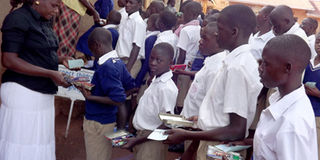End to examination malpractices still a dream

Students get checked before entering an examination hall last year. Despite such rigorous checks, malpractices in national exams still persist. Photo by Steven Ariong
What you need to know:
In about three months’ time, candidates will sit for Uneb exams but the story of malpractices may be far from over, writes David Mafabi.
Ismael Okurut, a secondary school teacher of Art and Design, was appointed to supervise the national Primary Leaving Examinations in Sironko District in 2014.
On reaching the school early in the morning, he found the head teacher and teachers in a meeting but he headed for the examination room.
Okurut says when he was invigilating the exam, he noticed that some of the pictures on the desks did not correspond with the candidate’s faces.
“I went to the headmaster’s office but before I could say anything, he asked me to calm down and introduced me to his teachers, invigilators and handed me Shs300,000 to help the students since that was a rural school,” said Okurut. He, however, refuses to mention the action he took after the incident.
Still a tough battle
At the release of the Uganda Certificate of Education last year, Uganda National Examinations Board [UNEB], withheld examination results of at least 1,886 candidates, while at the release of the 2016 Uganda Advanced Certificate Examination results UNEB withheld the results of 64 candidates from 11 examination centres across the country.
The UNEB executive secretary, Daniel Odong, said the results were withheld over examination malpractice that involved external assistance, collusion among candidates and smuggling of unauthorised material into the examination room.
Inadequate preparation
Daudi Mulongo, the former head teacher of Kiira College Butiki, says one of the factors contributing to examination malpractice is students who want qualifications without the willingness to acquire relevant knowledge and skills.
“Examination malpractice is also traceable to the teachers because they do not teach effectively giving chance to students to think about cheating,” said Mulongo.
He explained that laziness and inadequate preparation on the side of students for the examination also contributes to malpractices.
“He who fails to prepare, prepares to fail,” he says adding that since many who fail to prepare are bent on passing at all cost, cheating becomes their only option.
Corruption tendencies
However, Prosper Lwamasaka, the deputy director of education at KCCA, says corruption has been institutionalised in Uganda and examination malpractice is just one of the corrupt practices increasing due to competition for high grades among schools.
Lwamasaka says many officials of the examination body join fraudulent teachers and sometimes school administrators not only to allow cheating in examinations but promote the same.
“Some of the internal and external invigilators are given money, material gifts to enable cheating,” he says.
But the national examinations body says they are doing what it takes to end the vice.
“Uneb works with police officers across the country to fight malpractices. And to that effect, a number of people have been arrested, prosecuted and sent to jail,” Odong says.
The Kenya strategy
In Kenya apart from photographs, finger prints on certificates are used for identification as no two persons; even identical twins can have the same finger print.
The government has been tasked to play a very big role in curbing this menace by providing enough classrooms, desks and employing enough invigilators.
The government also passed the KNEC Act 2012 which provides for better management of national examinations with stiffer penalties for perpetrators of such malpractices but needed the regulations for smoother implementation.
The Act came into effect on October 19, 2014.
According to KNEC once the rules are gazetted any person involved in examinations malpractice faces a risk of a five-year jail term or Sh2 million in fines or both and that candidates found cheating will also be barred for up to three years from seating for any KNEC Examination.
Common malpractices
The UNEB public relations officer, Hamis Kaheru, names the following as the common malpractices across the country; leakages, impersonation, external assistance especially in science practicals and Art, smuggling of foreign materials copying, and collusion.




